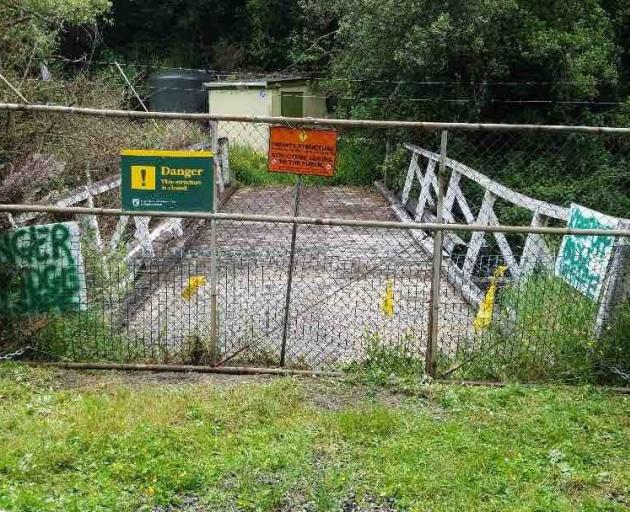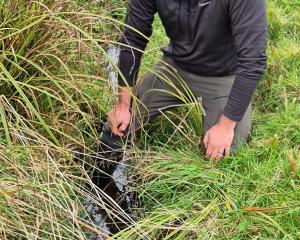
Resident Daniel Williamson told the Otago Daily Times yesterday critical infrastructure was at breaking point.
Despite its location in the Clutha district, the remote former hydro village is self-administered by a body corporate of residents, which owns and controls roading, bridges and water infrastructure serving about 30 homes.
Mr Williamson said residents attending a body corporate meeting with Taieri MP Ingrid Leary and Clutha Mayor Bryan Cadogan on Saturday were informed the Department of Conservation intended to remove a hazardous bridge in the village, thereby removing the only road access to its pump station.
The situation was compounded by ageing water infrastructure, he said.
‘‘It’s barely credible, but we’re told Doc wants to remove [Goys Track] bridge as soon as possible due to safety concerns.
‘‘Both the main freshwater pumps have failed, and the back-up pump is on its last legs, so it may be only a matter of days until we’re left without water altogether, and no way to fix it.’’
The consequences could be ‘‘dire’’ for the about 35 residents, Mr Williamson said.
‘‘We have three cancer patients in the village, and no water means no flushing toilets and no functioning sewage system.
‘‘The last thing we want to see is another Havelock North situation.’’
In 2016, a campylobacter contamination of the Havelock North water supply made 5500 of the town’s residents sick, 45 of whom were admitted to hospital.
Doc senior community ranger Craig Wilson said although the bridge belonged to the body corporate, it required a concession to be on conservation land.
‘‘The ... concession requires the bridge to be maintained to a safe standard. Advice from engineers is that this has not happened and the bridge is unsafe ... [and] currently closed to the public.’’
Doc understood the critical nature of the situation, he said.
‘‘No decisions have been made on the future of the bridge. We understand the need ... to have access to a suitable water supply, and ... a solution that is not a public safety hazard.’’
Ms Leary said she had written to Minister of Conservation Kiritapu Allan appealing for an urgent delay in removing the bridge.
‘‘The community has insisted on soldiering on with its own water assets, which appear to have become something of a liability — there is no easy fix.
‘‘There was consensus at the meeting that [Waipori] needs to start a constructive dialogue with local government and, potentially, the new water entity, to explore what is possible under [Three Waters] reforms.’’
Mr Cadogan said he sympathised with the residents.
‘‘I fear there is no easy solution, and certainly no cheap solution, but as residents of the district they deserve our best attempt to resolve the matter, if a resolution is possible.’’
Comments
Or the residents could install rain-water tanks, just like in most rural areas?
The article doesn’t mention that Waipori Village is a hydro village that dates right back to the 1900s. Originally set up for the dam workers, the village once boasted a shop, post office, petrol station, fire station and school. It still has a large concrete reservoir tank, capable of holding more than 200,000 litres of water with hydrants situated throughout the village to provide it with a unique fire-fighting ability.
The Waipori Village was originally established by the Waipori Falls Company in 1902 as part of that company’s electricity generation scheme which was purchased and completed by the Dunedin City Council in 1907. For almost a century, Waipori Falls hydro electric scheme has helped power nearby Dunedin. The Dunedin City Council sold the power scheme to TrustPower in 1998. The Waipori fund was established in 1999 using the proceeds from this sale, and since then has been a valuable contributor to the Dunedin City Council's finances. In its latest quarter, the Waipori fund had grown to 100 million dollars. The hydro village meanwhile has been forgotten about. There is so much history there, so much of it connected to Dunedin. Surely something can be done to help.













